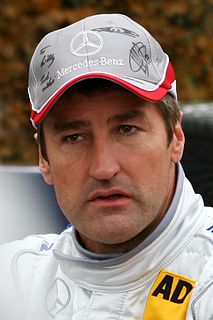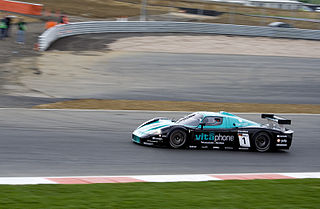
The FIA GT Championship was a sports car racing series organized by the Stéphane Ratel Organisation (SRO) at the behest of the Fédération Internationale de l'Automobile (FIA). The championship was mostly concentrated in Europe, but throughout the years has visited other continents including Asia and South America. At the end of 2009, the championship was replaced by the FIA GT1 World Championship, which morphed into the FIA GT Series for 2013.

The 1997 FIA GT Championship was the inaugural season of FIA GT Championship, an auto racing series endorsed by the Fédération Internationale de l'Automobile (FIA) and organized by the Stéphane Ratel Organisation (SRO). The FIA GT Championship replaced the BPR Global GT Series which had been held races and championships from 1994 to 1996 after the series was promoted by the FIA, while Stéphane Ratel took over as promoter and organizer of the new championship, replaced the former BPR Organisation after the departure of partners Jürgen Barth and Patrick Peter. The races featured grand touring cars conforming to two categories of regulations, GT1 and GT2, and awarded driver and team championships in each category. The season began on 13 April 1997 and ended on 26 October 1997 after 11 rounds, visiting Europe, Japan, and the United States.
The FIA GT3 European Championship was a sports car racing series organized by the Stéphane Ratel Organisation (SRO) and regulated by the Fédération Internationale de l'Automobile (FIA). It was a championship derived from the international FIA GT1 World Championship, but meant to provide competition for more amateur racers in closer to production cars. The series used extensive performance balancing and handicap weights to make cars more equal.
The BPR Global GT Series was a grand tourer-based sports car racing series which ran from 1994 to 1996 before becoming the FIA GT Championship in 1997. The series was founded by Jürgen Barth, Patrick Peter, and Stéphane Ratel as an international endurance racing series to replace the World Sportscar Championship which had ended in 1992.

The British GT Championship is a sports car racing series based predominantly in the United Kingdom. The series was originally created by the British Racing Drivers' Club in 1993 and, for its first two seasons, was known as the National Sports GT Challenge. The series is currently run by the Stéphane Ratel Organisation, while Pirelli began its first season as the championship's official sole tyre supplier in 2016.
The GT4 European Series is a sports car championship created and organised by the Stéphane Ratel Organisation (SRO). It is an amateur championship which followed a formula similar to the FIA GT3 European Championship, which was itself derived from the FIA GT Championship which utilized the GT1 and GT2 classes. The GT4 class cars are the least powerful of the four classes, yet are equalised in order to allow driving skill to become key.

The Stéphane Ratel Organisation (SRO) is a motorsport organization founded by French driver Stéphane Ratel in 1995. Based in London, the company is involved in the promotion, support, and organization of various national and international auto racing series around the world. The group is backed by the Fédération Internationale de l'Automobile (FIA), who provide the regulations for all international and most national SRO series. Local regulatory bodies also assist the SRO, such as the Fédération Française du Sport Automobile (FFSA) and Royal Automobile Club of Belgium (RACB).

The 2010 FIA GT1 World Championship was the inaugural FIA GT1 World Championship, a motor racing competition reserved for FIA GT1 cars. The championship was a replacement for the FIA GT Championship which had been held annually from 1997 to 2009. It was the first sports car racing series to be sanctioned by the Fédération Internationale de l'Automobile (FIA) as a World Championship since the demise of the World Sportscar Championship at the end of the 1992 season.
CRS Racing is a British auto racing team founded by British driver Andrew Kirkaldy and Canadian-Greek driver and entrepreneur Chris Niarchos. The team was founded in 2007, but is based on the former team of Kirkaldy known as Team AKA which competed in the British Formula Renault Championship starting in 2004. Niarchos, founder of the Cobra Group, sponsored and then partnered with Kirkaldy's team before it was reformed in 2007 in order to expand beyond Formula Renault to enter the European FIA GT Championship and British GT Championship.
The 2010 FIA GT3 European Championship season was the fifth season of the FIA GT3 European Championship. The season commenced on 1 May at Silverstone and ended on 10 October at Circuit Zolder. The season featured six double-header rounds, with each race lasting for a duration of 60 minutes. Most of the events were support races to the newly formed FIA GT1 World Championship.
The 2011 FIA GT3 European Championship season was the sixth season of the FIA GT3 European Championship. The season commenced on May 8 at Algarve and ended on October 16 at Zandvoort. The season featured six double-header rounds, with each race lasting for a duration of 60 minutes. Most of the events were support races to the 2011 FIA GT1 World Championship season.
The 2012 FIA GT1 World Championship was the third and final season of the SRO Group's FIA GT1 World Championship, an auto racing series for grand tourer cars. The 2012 championship, which opened to GT3 Series Grand Touring cars, featured two titles awarded to the highest scoring competitors over the course of the season: the GT1 World Championship for Drivers and the GT1 World Championship for Teams. The series underwent regulation changes in 2012 with GT3 cars replacing the GT1 category vehicles used in the previous two seasons of the World Championship. Hexis AMR, now under the title Hexis Racing, returned as the defending Teams' World Champions, while German drivers Michael Krumm and Lucas Luhr didn't return to the series to defend their Drivers' World Championships.
The 2012 FIA GT3 European Championship was the seventh season of the FIA GT3 European Championship. The season commenced on 8 April at Nogaro and ended on 23 September at the Nürburgring. The season featured six double-header rounds, with each race lasting for a duration of 60 minutes. Most of the events were support races to the 2012 FIA GT1 World Championship; two of the six meetings were run in conjunction with the FIA GT1 World Championship, with combined grids being utilised.

1 South African Infantry Battalion is a mechanized infantry unit of the South African Army.
The GT World Challenge Europe Sprint Cup, formerly the FIA GT Series it was sponsored by Blancpain from 2014 to 2019 where is was variously branded as the Blancpain Sprint Series in 2014 and 2015, the Blancpain GT Series Sprint Cup in 2016 to 2018, and the Blancpain GT World Challenge Europe in 2019. Is a sports car racing series organized by the Stéphane Ratel Organisation (SRO) with the approval of the Fédération Internationale de l'Automobile (FIA). The championship now exclusively races in Europe, but had in previous years visited other continents including Asia. The series continues the sprint format for GT-cars carried out by the defunct FIA GT1 World Championship.
The 2013 FIA GT Series was the first season following on from the demise of the SRO Group's FIA GT1 World Championship, an auto racing series for grand tourer cars. The series underwent changes in 2013, retaining GT3 cars as the mainstay, but creating sub-classes for Pro, Pro-Am and Gentleman driver line-ups. All-Inkl.com Münnich Motorsport did not return to defend their Teams' World Champions, instead moving to the World Touring Car Championship with one of the Drivers' World Champions Marc Basseng beside René Münnich, team director of All-Inkl.com Münnich Motorsport, and defending 2012 WTCC champion Rob Huff.
Group GT3, known technically as Cup Grand Touring Cars and commonly referred to as simply GT3, is a set of regulations maintained by the Fédération Internationale de l'Automobile (FIA) for grand tourer racing cars designed for use in various auto racing series throughout the world. The GT3 category was initially created in 2005 by the SRO Group as a third rung in the ladder of grand touring motorsport, below the Group GT1 and Group GT2 categories which were utilized in the SRO's FIA GT Championship, and launched its own series in 2006 called the FIA GT3 European Championship. Since then, Group GT3 has expanded to become the de facto category for many national and international grand touring series, although some series modify the ruleset from the FIA standard. By 2013, nearly 20 automobile manufacturers have built or been represented with GT3 machines.
The 2014 Blancpain Sprint Series is the second season following on from the demise of the SRO Group's FIA GT1 World Championship, the first with the designation of Blancpain Sprint Series.
GT World Challenge Europe is a sports car racing series organized by the Stéphane Ratel Organisation (SRO) with the approval of the Fédération Internationale de l'Automobile (FIA). It features grand tourer racing cars modified from production road cars complying with the FIA's GT3 regulations.

Group GT1 also known simply as GT1, was a set of regulations maintained formerly by the Fédération Internationale de l'Automobile (FIA), for Grand Tourer racing. The category was first created in 1994, as the top class of the BPR Global GT Series, and was included in the 24 Hours of Le Mans. It fell under FIA regulation from 1997, after the BPR series came under the control of the FIA, becoming known as the FIA GT Championship. The category was dissolved at the end of 2011. The category may be split into 4 distinctive eras, from its debut in 1994–1996, 1997–1998, 2000–2009, 2010–2011.






